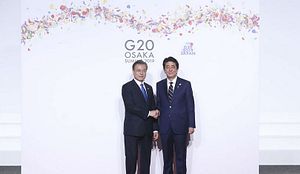Hopes for Japan and South Korean bilateral talks – and a move toward diplomatic reconciliation – were dashed with an eight second informal handshake at the entrance of G-20 opening ceremony late last month. Japan’s Prime Minister Shinzo Abe has been cautious about joining in two-party talks despite South Korean President Moon Jae-in confirming he was open to holding a summit on the sidelines of the G-20. Moon’s proposal was left hanging with no response from Tokyo.
To add to deteriorating tensions, Japan’s Ministry of Trade, Economy, and Industry announced one-sided economic sanctions last week targeting the supply chains of South Korea’s booming technology industry. Under the new export control system Japanese firms exporting three main chemicals needed in the manufacturing process for tablets and television screens to South Korea must submit individual applications prior to shipment.
With Japan boasting a 90 percent global market share in semiconductor materials such as fluorinated polyimide and hydrodrine fluoride, tightening export controls are likely to hit hard major South Korean companies like Samsung and LG Electronics. South Korea is also expected to be stripped from Japan’s preferential treatment list of “white states.” Comprising 27 “friendly” countries including Germany, the United Kingdom, and the United States, “white states” are currently exempt from obtaining a license to export products that have the potential to be used in weapon related applications.
A top government spokesman said the “white list” is founded on mutual trust and is “difficult” to continue under the current circumstances, following South Korea “denying a friendly and cooperative relationship between Tokyo and Seoul.”
Moon made his first public comment about the trade barriers on Monday, demanding Tokyo withdraw tough regulation on semiconductor materials and enter into a sincere discussion between the two countries. He acknowledged South Korea companies were under threat of “actual damage,” which would force him to regretfully take tit-for-tat countermeasures.
The relationship between Japan and South Korea is at its worst state in decades over the controversial issues of forced labor and sex slavery during Imperial Japanese rule over Korea. In 2018, a South Korean court ordered Japanese machinery firms to pay former Korean wartime laborers or their families compensation for forced labor during Japan’s colonial rule of the Korean Peninsula between 1910 to 1945. Meanwhile, the Japan-funded “comfort women” organization set up in 2015 – supposedly as part of a “final and irreversible” solution to the issue — was formally dismantled in South Korea without official consent from the Japanese government.
Japan’s Chief Cabinet Secretary Yoshihide Suga emphasized the trade measures were not retaliatory in nature but hinted at political justifications at a press conference, saying, “South Korea did not show a satisfactory solution over the issue of former workers on the Korean Peninsula before the G-20 summit and we cannot help but say the relationship of trust has been severely damaged.’”
In South Korea, anti-Japanese sentiment among the public has been steadily rising. On Friday a federation of small and medium Korean trade union groups staged a protest outside the Japanese embassy in Seoul, shouting “boycott Japanese products.” The group hosted a press conference in opposition to the strengthening export restrictions and announced they would stop selling Japanese products in retaliation. Suga said the Japanese government will monitor the potential Impact on Japanese firms
































